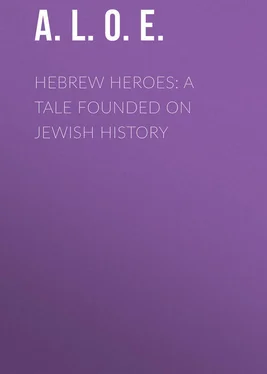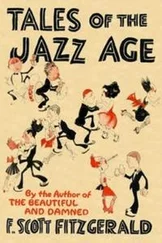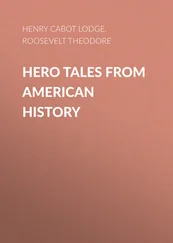A. L. O. E. - Hebrew Heroes - A Tale Founded on Jewish History
Здесь есть возможность читать онлайн «A. L. O. E. - Hebrew Heroes - A Tale Founded on Jewish History» — ознакомительный отрывок электронной книги совершенно бесплатно, а после прочтения отрывка купить полную версию. В некоторых случаях можно слушать аудио, скачать через торрент в формате fb2 и присутствует краткое содержание. Жанр: foreign_antique, foreign_prose, на английском языке. Описание произведения, (предисловие) а так же отзывы посетителей доступны на портале библиотеки ЛибКат.
- Название:Hebrew Heroes: A Tale Founded on Jewish History
- Автор:
- Жанр:
- Год:неизвестен
- ISBN:нет данных
- Рейтинг книги:4 / 5. Голосов: 1
-
Избранное:Добавить в избранное
- Отзывы:
-
Ваша оценка:
- 80
- 1
- 2
- 3
- 4
- 5
Hebrew Heroes: A Tale Founded on Jewish History: краткое содержание, описание и аннотация
Предлагаем к чтению аннотацию, описание, краткое содержание или предисловие (зависит от того, что написал сам автор книги «Hebrew Heroes: A Tale Founded on Jewish History»). Если вы не нашли необходимую информацию о книге — напишите в комментариях, мы постараемся отыскать её.
Hebrew Heroes: A Tale Founded on Jewish History — читать онлайн ознакомительный отрывок
Ниже представлен текст книги, разбитый по страницам. Система сохранения места последней прочитанной страницы, позволяет с удобством читать онлайн бесплатно книгу «Hebrew Heroes: A Tale Founded on Jewish History», без необходимости каждый раз заново искать на чём Вы остановились. Поставьте закладку, и сможете в любой момент перейти на страницу, на которой закончили чтение.
Интервал:
Закладка:
As he reached the highest point of one of these hills which stand round Jerusalem, like guardians of the holy and beautiful city, Judas paused and turned round to take what he felt might be a last look of Zion, over which the sun was about to rise. He gazed on the fair towers, the girdling walls, the sepulchres in the valleys, the temple crowning the height, with that intense love which glows in the bosom of every Hebrew deserving the name, a love in which piety mingles with patriotism, glorious memories with still more glorious hopes. From the Asmonean's lips burst the words in which the Psalmist has embalmed that love for all generations, – Beautiful for situation, the joy of the whole earth, is Mount Zion, the city of the great King. Mark ye well her bulwarks, consider her palaces; that ye may tell it to the generation following. Pray for the peace of Jerusalem: they shall prosper that love thee. Peace be within thy walls, and prosperity within thy palaces. If I forget thee, O Jerusalem, let my right hand forget her cunning; if I do not remember thee, let my tongue cleave to the roof of my mouth .
Faith was to the Asmonean as the rosy glow preceding the sunrise, which then flushed the eastern sky. His eye rested on the Temple; now desecrated, defiled, abandoned to the Gentile, and he remembered the promise regarding it: The Lord whom ye seek, shall suddenly come, to His Temple, even the Messenger of the Covenant whom ye delight in (Mal. iii. 8). Then the Hebrew's gaze wandered beyond to a fair hill, clothed with verdure, and his faith grasped the promise of God: Then shall the Lord go forth… and His feet shall stand in that day upon the Mount of Olives (Zech. xiv. 3, 4). Hope and joy were kindled at the thought. As surely as the hill itself should remain, so surely should a Temple stand on Mount Zion, till the Messiah should appear within it. God is not a man, that He should lie; neither the son of man, that He should repent: hath He said, and shall He not do it? (Num. xxiii. 19).
"Oh, that the Messiah might come in my day!" exclaimed the Asmonean; "that my eyes might behold the King in His beauty; that my voice might join the united acclamations of Israel, when the Son of David shall be seated on the throne of His fathers, and His enemies shall be made His footstool! That I might see the whole world worshipping in the presence of the Seed of the woman who shall bruise the serpent's head!" (Gen. iii. 15). The Hebrew grasped his javelin more firmly, and his dark eye dilated with joy and triumph. "But the night is not yet past for Israel," he added, more sadly; "the voice is not yet heard in the wilderness, Prepare ye the way of the Lord (Isa. xl. 8); we may have yet much to do and to suffer ere the Sun of Righteousness arise."
Then a softened expression stole over the features of the Asmonean, as he gazed in another direction, but still with his face turned towards the east. He could not see a white dwelling nestling under the shadow of a hill, but he knew well where it lay, and where she abode to whom he had bidden on that night a long, perhaps a last, farewell. The Asmonean stretched out his hand, and exclaimed, "Oh! Father of the fatherless, guard and bless her! To Thy care I commit the treasure of my soul!" And without trusting himself to linger longer, Judas turned and went on his way.
It was the month of Shebet, answering to the latter part of our January, and Palestine was already bright with the beauty of early spring. The purple mandrake was in flower, the crocus, tulip, and hyacinth enamelled the fields, with the blue lily contrasting with thousands of scarlet anemones. The almond-tree and the peach were in flower, and fragrant sighed the breeze over blossoms of lemon and citron. The winter had this year been mild, and some figs left from the last season still clung to the boughs yet bare of foliage. The vine on the terraced hills was bursting into leaf, and already in the fields the rising corn showed its young blades above the ground. But Judas was too much absorbed with his own thoughts to pay much attention to the landscape around him; with Israel the spiritual winter was not over, her time for the singing of birds had not come.
Onwards pressed the traveller without resting, till at about noonday he reached the valley of Ajalon. There was a fountain by the side of the road, and here the weary man slaked his thirst, and sat down for awhile to rest beneath the shade of some date-palms. The Asmonean took from the scrip which he carried his simple repast of dried figs, laved his brow and hands in the cooling water, blessed God for his food, and began to eat.
Ere many minutes had elapsed, a woman in the widow's garb of mourning, bearing a child of about six years old on her back, dragged her weary steps to the fountain by which the traveller was seated. She placed her boy on the ground, drank of the water herself, and gave to her son to drink. Her appearance denoted extreme poverty, and the child was evidently suffering from sickness.
Judas divided this slender supply of provisions into three portions, and with the courteous salutation of "Peace be with you," offered one to the widow, and one to the boy.
"The blessing of the God of Abraham be with you!" exclaimed the poor woman; "your servant hath not tasted food since sunset." And, seated on the turf not far from Judas, the widow and her son partook of the dried figs with the eagerness of those who are well-nigh famished.
"Your child looks ill," observed the Asmonean, regarding with compassion the wasted shrunken frame of the boy.
"He will not suffer long," replied the widow, with the calm apathy of despair. "I laid his father's head in the grave last month, and I shall lay Terah's head beside him this month. The seal of death is upon him; I shall soon be alone in the world."
"Nay, despair not, God is good; the child may yet live," said Judas.
"Why should I wish him to live," murmured the widow. "His father was taken from the evil to come, the boy will be taken from the evil to come. Jerusalem is defiled, the land is in bondage, Israel is given a prey to the heathen! The faithful are few in the land, and persecution will sweep these few away. There is no resting-place but under the sod, no freedom but in the grave. The name of Judah will soon be blotted out from amongst the nations!"
"Never!" exclaimed Judas, with energy; "never, while the God of Truth lives and reigns! Judah can never perish. The vine that was brought out of Egypt may be broken, her branches torn away, her fruit scattered, the boar out of the wood may waste it, and the wild beast of the field devour, but yet Israel shall blossom and bud, and fill the face of the world with fruit (Isa. xxvii. 6). Were but one man left of God's chosen people, yet from that one man should spring the Deliverer who shall yet speak peace to the nations, and reign for ever and ever!"
"Could I but hope – " faltered the widow.
"Can you not believe ?" exclaimed the Asmonean. "See yonder – look to the east – there is Gibeon, over which the sun stayed at the voice of Joshua; over this valley of Ajalon hung the moon arrested in her course in the day when the Amorites fled before Israel. He who raised up Moses, Joshua, and Gideon, can by human instruments, or without them, repeat the miracles wrought of old, and again deliver His people."
As he concluded the last sentence, the Asmonean rose to continue his journey; he could give his weary limbs but little time for rest, for long was the distance which he yet had to traverse.
"My home is but a furlong further on," said the widow, also rising, "and I have again strength to go forward."
She was about to lift up her boy, but Judas prevented her. "I can relieve you of that burden," he said, and raised the child on his shoulders.
Читать дальшеИнтервал:
Закладка:
Похожие книги на «Hebrew Heroes: A Tale Founded on Jewish History»
Представляем Вашему вниманию похожие книги на «Hebrew Heroes: A Tale Founded on Jewish History» списком для выбора. Мы отобрали схожую по названию и смыслу литературу в надежде предоставить читателям больше вариантов отыскать новые, интересные, ещё непрочитанные произведения.
Обсуждение, отзывы о книге «Hebrew Heroes: A Tale Founded on Jewish History» и просто собственные мнения читателей. Оставьте ваши комментарии, напишите, что Вы думаете о произведении, его смысле или главных героях. Укажите что конкретно понравилось, а что нет, и почему Вы так считаете.











